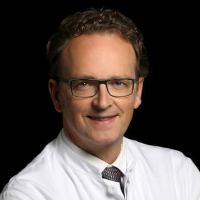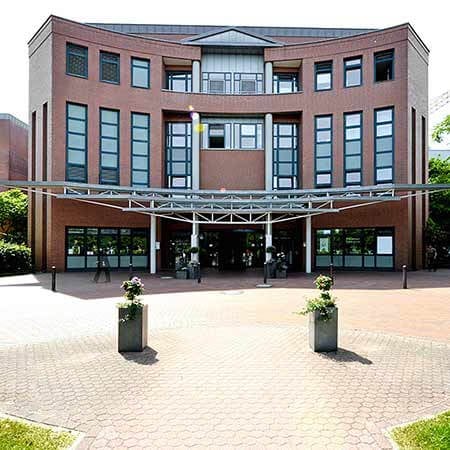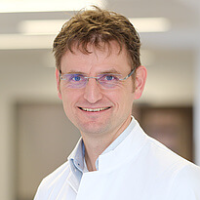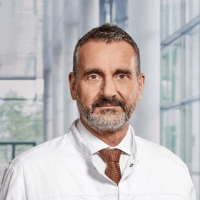Surgical treatment With the Heart-lung Machine for Congenital and Acquired Heart Defects in Germany
Treatment prices are regulated by national law of the corresponding countries, but can also include additional hospital coefficients. In order to receive the individual cost calculation, please send us the request and medical records.

Department of Cardiothoracic Surgery
According to the Focus magazine, the Department of Cardiothoracic Surgery ranks among the top German medical facilities specializing in the surgical treatment of diseases of the cardiovascular system and lung cancer! The department offers the full range of surgical services for the treatment of diseases of the cardiovascular system, respiratory tract, including heart and lung transplantation, artificial heart implantation. The therapeutic options include aortic surgery, coronary artery bypass grafting, transplantation surgery, surgical treatment of heart rhythm disorders (arrhythmias), minimally invasive surgery, surgical treatment of the heart valves, including reconstructive interventions. All operations are performed using state-of-the-art technology and in accordance with the current recommendations of professional societies.






Department of Cardiac Surgery
The Department of Cardiac Surgery provides a full range of surgical treatment in its area of specialization. Special emphasis is placed on heart valve repair and replacement surgery, coronary artery bypass grafting, thoracic aortic surgery, adult congenital and acquired heart disease surgery, pacemaker and defibrillator implantation, and artificial heart implantation for severe heart failure. Many heart operations are performed using minimally invasive techniques, which has a positive effect on the healing of the surgical wound. Minimally invasive cardiac procedures also reduce surgical risks and contribute to a rapid recovery of the patient in the postoperative period. Surgical treatment of cardiac pathologies is performed in advanced operating rooms equipped with the latest technology. The cardiac surgeons of the department successfully perform routine and complex surgical procedures, saving the lives of thousands of patients. The specialists work in accordance with current clinical protocols and follow the recommendations of the German Society for Thoracic and Cardiovascular Surgery (DGTHG).


Department of Cardiothoracic Surgery and Vascular Surgery
The Department of Cardiothoracic Surgery and Vascular Surgery provides effective surgical treatment for diseases of the heart, respiratory system, and blood vessels. The team of cardiac surgeons operates on patients with heart valve pathologies, coronary heart disease, heart failure, and heart rhythm disturbances. In the field of thoracic surgery, the key focus is on the surgical removal of lung tumors and lung metastases. The specialists in this area also perform surgery to repair chest wall deformities. In the field of vascular surgery, interventions for abdominal and thoracic aortic aneurysms are most often performed here. The department's vascular surgeons are also exceptionally competent in the treatment of peripheral occlusive arterial disease. A great advantage for the department's patients is that almost all surgical interventions are performed using minimally invasive techniques, so there is no need for a long postoperative recovery. The department's operating rooms are equipped with state-of-the-art technology. This allows for effective and safe treatment. The priority is always personalized medical care for patients.






Doctors treat most congenital and acquired heart defects with open-heart surgery. The heart is stopped for a while, and the functions of the heart and lungs are taken over by a heart-lung machine. The device saturates the blood with oxygen and pumps it through the patient's blood vessels. If you need surgery to repair a heart defect, you can go to Germany for surgical treatment. In this country, it will be safe with reliable results.
Content
- Who may need treatment of congenital and acquired heart defects with the use of a heart-lung machine?
- What is a heart-lung machine?
- How is a heart-lung machine connected for congenital and acquired heart defects?
- Where to have your treatment for congenital and acquired heart defects?
Who may need treatment of congenital and acquired heart defects with the use of a heart-lung machine?
In Germany, many operations for the treatment of congenital and acquired heart defects are performed using a heart-lung machine. Heart-lung machines are usually used during open-heart procedures. As a rule, the use of a heart-lung machine implies cardioplegia, in which the heart stops and relaxes. Less commonly, surgery is performed on a beating heart, despite the use of a heart-lung machine.
The following acquired heart defects can be treated with open-heart surgery using a heart-lung machine:
- aortic valve stenosis or insufficiency;
- mitral valve stenosis or insufficiency;
- tricuspid valve insufficiency or stenosis;
- pulmonary valve regurgitation or stenosis.
Patients do not always require surgery using a heart-lung machine. Whenever possible, doctors strive to solve the problem using minimally invasive techniques. In Germany, most surgeries for aortic valve stenosis and many surgeries for mitral valve regurgitation are performed using endovascular techniques (from inside the blood vessels) or through short chest incisions. When several heart valves are damaged, when stenosis is combined with insufficiency, and in patients from a low surgical risk group, open operations with heart-lung machines are mainly performed.
Congenital heart defects, in which surgical interventions with the use of a heart-lung machine are performed in Germany, include the following:
- tetralogy of Fallot;
- Eisenmenger syndrome;
- anomalous pulmonary venous connection;
- congenital heart valve stenosis or insufficiency;
- coarctation of the aorta;
- transposition of the great vessels.
At the same time, for the treatment of congenital heart defects in Germany, minimally invasive procedures are increasingly being used instead of traumatic operations with heart-lung machines. Endovascular techniques are successfully used to treat ventricular septal defects, atrial septal defects, patent ductus arteriosus, and aortic stenosis.
What is a heart-lung machine?
A heart-lung machine has been used in medicine since 1953, when, using the world's first apparatus, J. Gibbon performed an operation to suture the atrial septum. The operation was performed on a beating heart, but the blood did not pass through the lungs, and it was saturated with oxygen using a heart-lung machine. The first devices were unsafe, it was difficult to operate them, and about 5 liters of donor blood were spent during the operation.
The devices were, however, improved. Techniques of hypothermia (lowering body temperature), hemodilution (blood dilution), and myocardial protection appeared. Today, the use of heart-lung machines has a minimal adverse impact on the body.
A heart-lung machine consists of the following two units:
- a mechanical unit that temporarily replaces a person's heart;
- a physiological unit that replaces the lungs.
The mechanical unit includes a pump, which can be roller or centrifugal, and artificial circulation safety control systems that record pressure, temperature, air bubbles, tank level, etc. The main thing in the mechanical unit is a pump that replaces the heart. Depending on whether doctors use full or assisted artificial blood circulation, it can operate in a variety of modes, replacing total or partial minute blood exchange.
The physiological unit includes an oxygenator. It saturates the blood with oxygen and absorbs carbon dioxide from it, which means that it does what the human lungs usually do. German hospitals perform surgical treatment using a heart-lung machine with membrane oxygenators. Gas exchange is carried out through a gas-permeable membrane in this device. The advantages of using such heart-lung machines are the absence of mechanical damage to proteins and blood cells, as well as the provision of an optimal blood gas composition, due to which organs and tissues always receive a sufficient amount of oxygen.
How is a heart-lung machine connected for congenital and acquired heart defects?
Depending on the disease being treated, a heart-lung machine can be connected in different ways. In any case, the device takes blood from some blood vessels and returns it to others.
In standard cases, the device is connected to the superior or inferior vena cava and the aorta. This option is suitable for operations in which the heart chambers are opened.
Sometimes the heart is not opened, for example, during the treatment of congenital heart defects that affect only large blood vessels. One venous catheter is sufficient in this case. Two-section models are also used, which take blood from the right atrium and return it to the inferior vena cava.
In cases where operations are performed on the aorta and revision surgical interventions are performed on the heart, the catheter is often placed in the femoral artery. Occasionally, the left atrium and left ventricle are used, as well as the femoral artery and femoral vein connection. These options are mainly used during operations on the thoracoabdominal aorta.
The diameter of the catheter is selected individually. It depends on the patient's body weight, the diameter of their blood vessels, and the mode of the heart-lung machine. In standard cases, the diameter of the catheter is no more than two-thirds the diameter of the blood vessel. It is important to place the catheters properly and constantly monitor the pressure to avoid complications such as blood vessel dissection or tissue edema due to impaired venous return.
Where to have your treatment for congenital and acquired heart defects?
You can undergo your treatment in Germany. Doctors in this country achieve outstanding results in the treatment of congenital and acquired heart defects. Surgeons completely cure the disease, normalizing hemodynamics and preventing the development of arrhythmias, heart failure, and other complications. There are a few reasons for you to undergo your treatment in Germany. These are the following:
- state-of-the-art heart-lung machines are used, which almost never injure blood cells and proteins and also maintain the optimal blood gas composition;
- modern myocardial protection techniques are used, which allows for the avoidance of complications;
- the best Cardiosurgery Centers perform robot-assisted heart surgery;
- several heart defects can be repaired at the same time;
- if necessary, surgical treatment of several diseases is carried out simultaneously in one operation, for example, a heart defect and coronary heart disease;
- following surgery, patients receive comprehensive care, adequate pain relief, symptomatic therapy, and cardiac rehabilitation.
You can find out the prices for treatment on the Booking Health website. The website offers the current cost of treatment in Germany. You can compare the cost of treatment in Germany at different hospitals to choose a medical care program at the best price. The Booking Health specialists will help you make the right choice and provide services for the organization of treatment. When you make your treatment appointment through the Booking Health service, the cost of treatment in Germany will be lower for you due to the absence of taxes for foreign patients.
Authors:
The article was edited by medical experts, board-certified doctors Dr. Nadezhda Ivanisova and Dr. Vadim Zhiliuk. For the treatment of the conditions referred to in the article, you must consult a doctor; the information in the article is not intended for self-medication!
Sources:
ECR - European Cardiology Review

